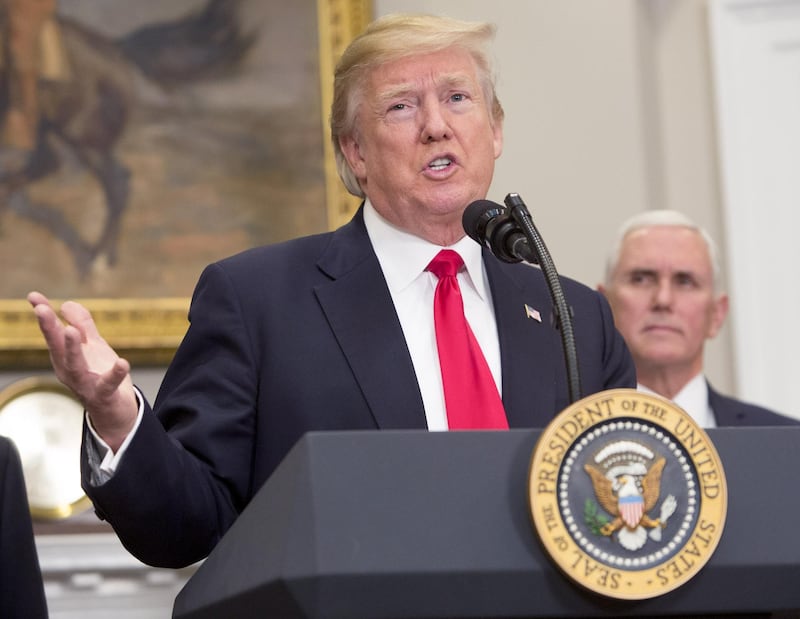Donald Trump may allow the release of a classified memo that could undermine the main investigation of Russia's alleged meddling in the 2016 presidential election, despite the CIA warning that Moscow may interfere in polls again.
His administration on Monday published a list of influential Russians close to president Vladimir Putin but stopped short of imposing fresh sanctions as punishment for Kremlin efforts to sway the outcome of the vote that put Mr Trump in the White House. The lack of penalties prompted critics to warn that the US president was not taking the threat seriously.
Mike Pompeo, the CIA director, had earlier outlined the danger posed by Russia in US midterm elections that will happen in November.
“I haven't seen a significant decrease in their activity," he told the BBC.
Asked if Russia would try to influence the upcoming vote, he said: "Of course. I have every expectation that they will continue to try and do that.
“But I am confident that America will be able to have a free and fair election."
The Russia investigation is led by special counsel Robert Mueller and it has already produced charges against four of Mr Trump's former campaign advisers.
But Democrats and some moderate Republicans said the refusal to adopt new sanctions amounted to a failure to defend the US against hostile forces.
Evan McMullin, who ran as an independent in the 2016 presidential election, wrote on Twitter: “@realDonaldTrump is refusing to implement new bipartisan Kremlin sanctions vital to protecting our democracy. In doing so, he’s chosen Putin’s interests over our own.
"Trump's subservience to Moscow is real and a serious national security problem."
Eliot Engel, the most senior Democrat on the House Foreign Affairs Committee, said Mr Trump was letting Russia off the hook.
"How do you deter an attack that happened two years ago, and another that's already under way?" he said. "It just doesn't make sense."
On Monday, Republicans on the House intelligence committee voted to release their classified memo alleging that the FBI and the Justice Department used improper government surveillance during the investigation into Russian interference.
Their four-page document has become a political flashpoint. Mr Trump and his supporters suggest it demonstrates how federal investigators have conspired against the president.
But Democrats on the committee say it amounts to nothing more than a set of unsubstantiated Republican talking points cherry-picked from the mass of information.
They believe it is an attempt to discredit special counsel Mueller’s investigation.
_______________
Read more:
CIA predicts Russian meddling in US midterm elections but no new sanctions on the way
Russia inquiry draws closer to the White House
_______________
“They will trample on anything to protect the White House at this point in time,” said Mike Quigley, a Democrat who sits on the committee.
Officials said the memo was couriered to the White House on Monday evening. The president has five days to decide whether to block its release or allow it to be declassified.
His administration has been overshadowed for the past year by allegations his campaign team colluded with Russia to win the election.
He has repeatedly dismissed allegations – backed by his own intelligence services – that the Kremlin worked to discredit his opponent Hillary Clinton
Last year Democrats and Republicans passed a bill authorising the administration to use sanctions to punish Moscow and to prevent future interference.
Congress set a January 29 deadline to take action or explain why it had not done so.
But as the deadline expired Heather Nauert, a State Department spokeswoman, said the mere threat of fresh measures was sufficient.
"Today, we have informed Congress that this legislation and its implementation are deterring Russian defence sales," she said.
The decision provided fresh ammunition for critics who say the Trump administration has been - at best - too soft on Mr Putin or - at worst – complicit.
However, the administration did publish a list of officials and oligarchs close to the Kremlin angering the Russian president who said it amounted to an attack on all Russians, labelling it a “hostile step”.
It named 210 wealthy or influential Russians as part of the sanctions law.
"We were waiting for this list to come out, and I'm not going to hide it: we were going to take steps in response, and, mind you, serious steps, that could push our relations to the nadir. But we're going to refrain from taking these steps for now," Mr Putin said.
The list includes "siloviki" - prominent figures from Russia's security services – such as Alexander Bortnikov, head of the FSB. It also features the men who head the energy companies Gazprom and Rosneft, as well as banks and Roman Abramovich, who owns Chelsea Football Club.
Wealthy Russians feared the document – known informally as the “Putin list” - could amount to a blacklist, preventing them using global financial institutions, but the US Treasury Department insisted that was not the case.
"Neither does inclusion on the unclassified list indicate that the US government has information about the individual's involvement in malign activities," it said.






